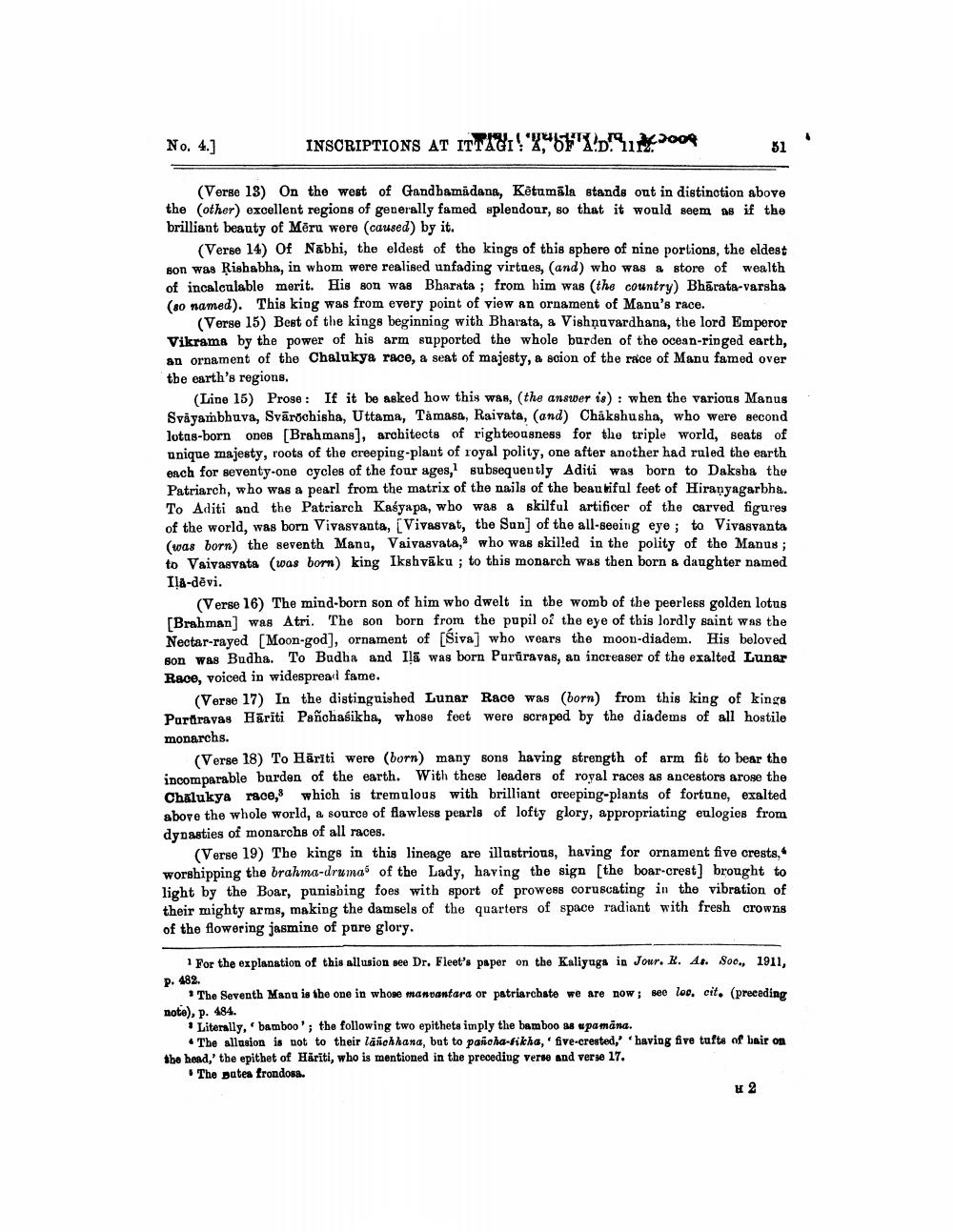________________
No. 4.]
INSCRIPTIONS AT ITTAUI!'*57*XD!
2004
51
(Verse 13) On the west of Gandbamädane, Ketumāla stands out in distinction above the (other) excellent regions of generally famed splendour, so that it would seem as if the brilliant beauty of Mēru were caused) by it.
(Verse 14) Of Nabhi, the eldest of the kings of this sphere of nine portions, the eldest son was Rishabha, in whom were realised unfading virtues, (and) who was a store of wealth of incalculable merit. His son was Bharata ; from him was the country) Bhārata-varsha (80 named). This king was from every point of view an ornament of Manu's race.
(Verse 15) Best of the kings beginning with Bharata, a Vishnuvardhana, the lord Emperor Vikrama by the power of his arm supported the whole burden of the ocean-ringed earth, an ornament of the Chalukya race, a seat of majesty, a scion of the race of Manu famed over the earth's regions.
(Line 15) Proge: If it be asked how this was, (the answer is): when the various Manus Svayambhuva, Svārochisha, Uttama, Támasz, Raivata, (and) Chakshusha, who were second lotas-born ones (Brahmans], architects of righteousness for the triple world, Beats of unique majesty, roots of the creeping-plant of royal polity, one after another had ruled the earth each for seventy-one cycles of the four ages, subsequently Aditi was born to Daksha the Patriarch, who was a pearl from the matrix of the nails of the beautiful feet of Hiranyagarbha. To Aditi and the Patriarch Kaśyapa, who was a skilful artificer of the carved figures of the world, was born Vivasvanta, Vivasvat, the Sun] of the all-seeing eye; to Vivasvanta (was born) the seventh Mana, Vaivasvata, who was skilled in the polity of the Manus; to Vaivasvata (was born) king Ikshvāku ; to this monarch was then born a daughter named I!a-dēvi.
(Verse 16) The mind-born son of him who dwelt in the womb of the peerless golden lotus [Brahman) was Atri. The son born from the pupil of the eye of this lordly saint was the Nectar-rayed [Moon-god), ornament of [Siva] who wears the moon-diadem. His beloved Bon was Budha. To Budha and Iļā was born Pururavas, an increaser of the exalted Lunar Race, voiced in widespread fame.
(Verse 17) In the distinguished Lunar Race was (born) from this king of kings Purtravas Hariti Pañchasikha, whose foet were scraped by the diadems of all hostile monarchs.
(Verse 18) To Hārīti were (born) many sons having strength of arm fit to bear the incomparable burden of the earth. With these leaders of royal races as ancestors arose the Chalukya race, which is tremulous with brilliant creeping-plants of fortune, exalted above the whole world, a source of flawless pearls of lofty glory, appropriating eulogies from dynasties of monarchs of all races.
(Verse 19) The kings in this lineage are illastrious, having for ornament five crests, worshipping the brahma-druma of the Lady, having the sign [the boar-crest] brought to light by the Boar, punisbing foes with sport of prowess coruscating in the vibration of their mighty arms, making the damsels of the quarters of space radiant with fresh crowns of the flowering jasmine of pure glory.
For the explanation of this allusion see Dr. Fleet's paper on the Kaliyuga in Jour. K. 46. Soc., 1911,
P. 482.
* The Seventh Manu is the one in whose manvantara or patriarchate we are now; see loo. cit. (preceding note), p. 484.
Literally, bamboo'; the following two epithets imply the bamboo se upamana.
• The allusion is not to their laichhana, but to pancha-likha,' five-crested,' having five tufts of hair on the head, the epithet of Härīti, who is mentioned in the preceding verse and verse 17. The patea frondosa.
H 2




